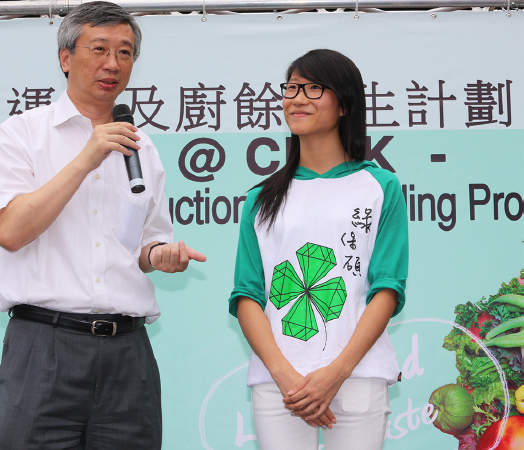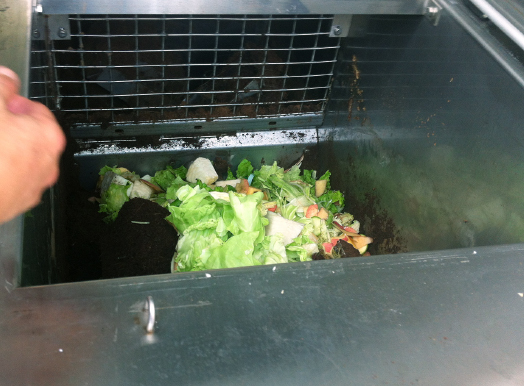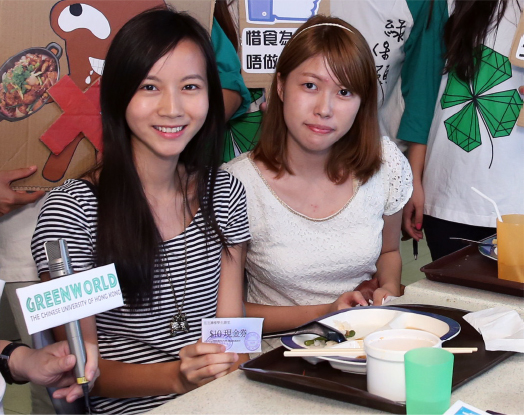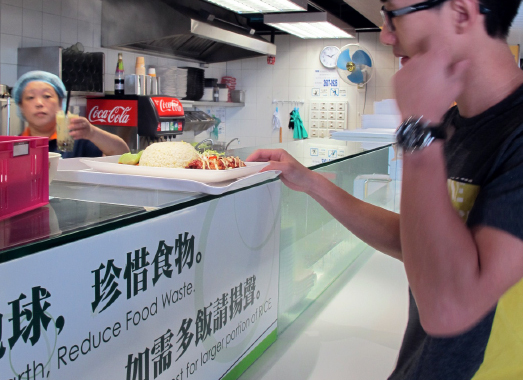Nurturing a Culture of Mindful Eating: Food Waste Recycling
The University has launched a two-year food waste education campaign on 18 September. The Love Food Hate Waste @CUHK–Education Campaign and Food Waste Reduction & Recycling Programme is expected to turn the campus into a 'living laboratory' for food waste reduction and recycling. At the launch ceremony, opening remarks by Professor Fung Tung (right), Associate Pro-Vice-Chancellor and associate director of the Institute of Environment, Energy and Sustainability, were followed by the premiere of a micro-film on minimizing food waste produced by a group called The Leftovers. Professor Fung also distributed coupons to canteen diners who finished all their food in an awareness-raising activity to promote waste reduction at source.


Installation of decomposers
One of the campaign's first initiatives is the acquisition of two decomposers that turn kitchen scraps into compost for landscaping purposes. The machines can each handle 300 to 400 kg of leftovers a week. The University's initial target is to reduce food waste by at least 20% by 2014–15. The campaign comes alongside other efforts to lower the volume of kitchen waste generated on campus—some canteens are now advised to serve less rice if diners are generally found to leave rice unfinished on plates, and diners are urged to order only as much as they need.
Though this is the first time the University is handling food waste on this scale, composting is not new to CUHK. For over a decade, we have been composting 10 to 20 tonnes per year of usable food scraps the natural way—with tumblers, and using the compost as fertilizers on our verdant campus.
Students' 'Clean the Plate' Campaign
Alongside the University's efforts, a student body, Green World, has been organizing a 'Clean the Plate' campaign since March this year. The committee members of the organization distribute food and beverage coupons to reward students who have finished all their food and to encourage those who haven't to do so, in the hope that the financial incentive will serve as tinder for long-term behavioural change.
Green World targets the following diners: those who are seen to (1) finish all the food they ordered, (2) be almost done with their meals. The first two categories are given coupons and verbal pats on the back so they will continue their practice. The last group is persuaded to finish the food on the plates using the coupons as carrots. Coupons are distributed in a high-profile manner to catch the attention of diners who are not target candidates in order to spread the message of zero food wastage.
Chan Ka-sing, external vice-president of Green World, said they usually approach students dining in a group to maximize reach and put those targeted at ease. 'We will praise those who have finished all the food on their plates and urge those who haven't done to try their best. We'll also talk to them about the food waste problem and how with a bit of mindfulness something as simple as eating can become more eco-friendly,' he remarked. 'Then we will leave them in peace and check back after a few minutes. Those who have cleaned their plates will be rewarded with coupons. I think people may be numbed by shocking figures of how much food is wasted in Hong Kong, so it's good to reward them for doing the right thing for a change.'
The campaign, begun in March 2013 with a two-month break in July and August, is conducted thrice a week on average at a few student canteens. 'We prefer not to announce when and where we're going so people will be caught unawares,' Chan said. The group issued $5 coupons from March to June and is giving out $10 ones in this semester.


The Less Rice Campaign, begun by Greeners Action some years ago, is still ongoing at campus canteens. It urges diners to request less rice from the servers if they don't think they can finish the whole plate.
Multi-pronged approach
The committee of Green World will soon decide if the campaign will be extended to 2014. In the meantime plans are underway to roll out more educational activities and introduce more decomposers and composting methods on campus, pending funding approval by the Environment and Conservation Fund. One of the University's mid-term sustainability targets is to make food waste management compulsory in the tenders and contracts for all canteen caterers when the existing contracts expire in 2016 at the latest. By encouraging University members to consume less extravagantly and turning what waste we have into something useful, the University is setting an example for green consumption.
Why Recycle Food Waste?
According to the Environmental Protection Department in 2011-12, 3,200 tons of food are sent to the landfill every day, accounting for a third of all solid waste in Hong Kong. The volume of food waste has doubled in the last five years, while the remaining capacities of our three landfills will be exhausted in 2014, 2016 and 2018. That said, the matter isn't only about landfill capacities. Picking up and delivering food waste to the landfills yields a high carbon footprint. Food waste attracts pests and releases odours and liquids that are toxic to the environment. The methane gas generated from food waste is also a lot more potent than carbon dioxide. Clearly, Hong Kong cannot drag its feet much longer in finding greener solutions to the food waste problem.



